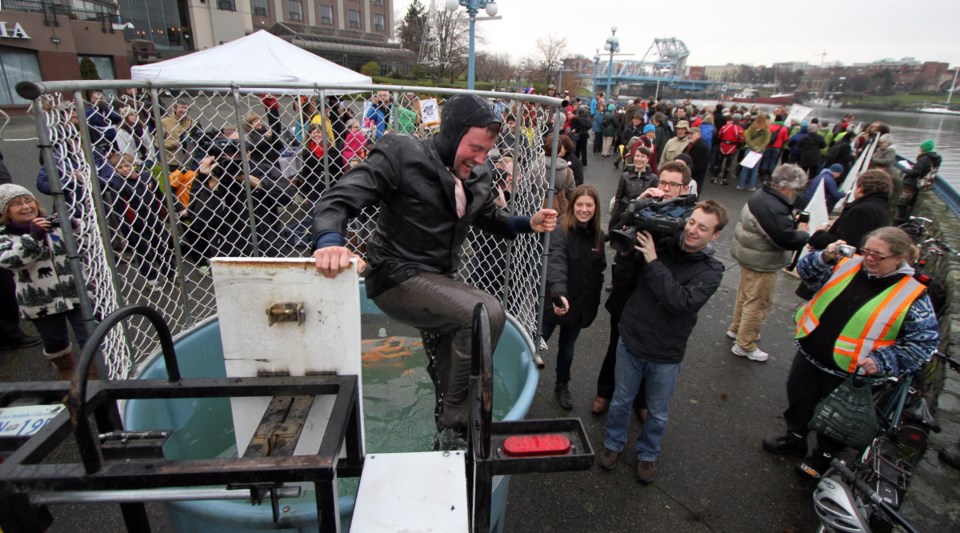With all respect to the eco-hippies, if the Northern Gateway oil pipeline gets stopped, it’s going to be by Bill Eisenhauer, not the circus outside the Delta Ocean Pointe.
About 100 people demonstrated Friday outside the hotel, where the panel reviewing Enbridge’s proposal began a week of hearings.
A young man portraying an Enbridge executive plunged into a dunk tank. Wobbly bits turned blue as three demonstrators shivered naked behind a banner that read “Vulnerable.” A man in a rowboat festooned with anti-pipeline slogans oared around the Inner Harbour, while other protesters waved placards bearing messages such as “We will not whore out our mother.”
Predictable tactics from predictable faces. Politicians yawn.
Inside, it was a different story. The panel reviewing Enbridge’s proposal to build a 1,150-kilometre pipeline from Alberta to a terminal at Kitimat will spend until Jan. 11 hearing presentations from more than 270 Victorians, all of whom signed up for the opportunity at least 15 months ago.
First up was Eisenhauer, with a message echoed throughout the day: Northern Gateway represents a rush to sell off a precious resource in a reckless fashion, the threat to the environment outweighing the benefit. “There are many, many other less risky and less toxic ways to generate economic growth,” he testified.
Eisenhauer is not an eco-hippie. He wore a suit and tie, no hackey sack in sight. He’s a solid community guy: a 45-year-old dad who has his own communications business, sits on the Victoria Hospice Foundation board, coaches a Bays United soccer team and helped organize the local leg of the Olympic torch relay.
In other words, he’s mainstream, the kind of voter whose opinion carries weight with politicians. His is the voice — or at least a voice — of Middle Canada. “That is one of the reasons I thought it was important that I make the effort,” he said later.
He’s not alone. While the list of speakers is liberally sprinkled with environmental activists, Friday’s Ocean Pointe waiting room looked more like a United Church service than a Grateful Dead concert.
That’s not the image they get across the Rockies, where a different narrative is told. The conventional Albertan perspective is that the world needs oil, we have it, we just need to get it to market. Our traditional customers are in the U.S. heartland, but the Americans have rejected the Keystone pipeline that would take it there. Besides, the oil companies can get a much higher price from the Asians, so let’s build a pipeline to the coast and sell to them instead.
British Columbians’ opposition to Northern Gateway (a December poll put it at 60 per cent) is seen as opportunistic. In July, when Premier Christy Clark listed five conditions that must be met before the province would consider supporting a pipeline proposal, other Canadians seized on the one that had to do with sharing economic benefit; in essence, Alberta saw B.C.’s position as thinly veiled extortion, a money grab. Environmental concerns were dismissed as window dressing, of real concern to only a vocal minority of aboriginals and quinoa-smoking treehuggers.
That at least a faction of pipeline opponents are stuck in that pigeon hole, viewed as a potentially disruptive fringe, was reflected in Friday’s elaborate security at the hotel, where a contingent of Victoria police officers happily picked up some post-holiday overtime (not at taxpayer expense; all pipeline-review costs are paid by the applicant) as a precaution against disorder. Members of the public were barred from attending the presentations. They had to watch online or three kilometres away on a big screen at the Ramada — the kids’ table at Christmas dinner. Politicians don’t take kids seriously.
The joint review panel will continue gathering arguments until June, releasing its recommendation by Dec. 31.



